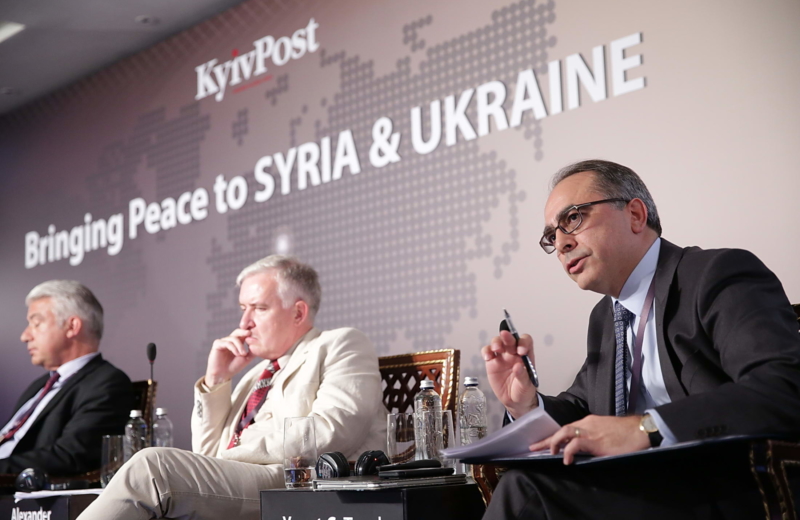Divisions in the Western alliance were on full display at the “Steps for Peace” panel at the Kyiv Post’s June 18 “Bringing Peace to Syria & Ukraine” conference.
Ambassadors from Turkey, Germany, and the European Union argued over the Syria conflict with a longtime Middle East expert and a Syrian diplomat who defected from the Bashar al-Assad regime.
But it was questions around the issue of five million Syrian refugees that sparked the most debate at the panel.
“The real trouble is that the refugee crisis is still primarily in the Middle East, and will stay there, because these countries are facing the challenge and have accommodated a far greater number of refuges than the West,” said Oleksandr Bogomolov, director of the Institute of Oriental Studies in Kyiv and a former Soviet operative in Yemen.
Turkish Ambassador Yonet Tezel suggested that the West only began to confront the humanitarian catastrophe of Syrian refugees when they began to appear in Europe.
“Unfortunately (our allies) only became more interested in the issue when they began to see migrants,” Tezel said.
Tezel also defended the Astana process – a parallel to the Geneva talks that instead involves Russia, Iran, and Syria – while subtly placing blame for the region’s issues on Western intervention.
“We did not start the Arab Spring, or the Gulf War, or the Palestine-Israeli conflict, or the other conflicts,” Tezel said. “But look at the map – we have to deal with this.”
Ernst Reichel, Germany’s ambassador to Ukraine, disputed Tezel’s suggestion that Europe had been removed from the conflict.
“Germany has not been on the sidelines,” he said.
Russia
Much of the discussion revolved around Western policy towards Russia, and the extent to which the Syria and Ukraine conflicts bear any similarities beyond the presence of Russian aggression.
“Russia being involved in both conflicts should not lead us to invent any kind of link,” said European Union Ambassador Hughes Mingarelli, echoing Reichel’s opinion.
The two non-ambassadors on the panel – Bogomolov and defected Syrian diplomat Hussein Sabbagh – argued in favor of a link.
“The international community should start thinking about linking both issues together in terms of policy responses,” Sabbagh said.
“What I find bizarre is that the international community has chosen to rely on Russia to restrain the Syrian regime,” he added. “The Russians are unwilling to stop the Assad regime from continuing atrocities against its own people.”
Bogomolov said that the two conflicts are “related hour-by-hour and day-by-day. Look at the timetable of the Geneva II talks – they started the same day that the first protester was killed outside my window on Hrushevsoho (Street),” he said, speaking of killings during the 2014 EuroMaidan Revolution in January of that year that ended in President Viktor Yanukovych fleeing power on Feb. 22, 2014.
During a question and answer session, one audience member accused the entire German political establishment of being in Vladimir Putin’s pocket and therefore failing to resist Russian aggression in Ukraine and Syria.
Reichel replied indignantly, saying “it’s more of an insult than a question. It’s like asking, ‘when did you stop beating your wife,’” he added.
After a follow-up question regarding former German Chancellor and current Rosneft chairman Gerhard Schroeder, Reichel replied that “the difference between Chancellor Merkel and Schroeder is that Merkel is in office.”
Bogomolov added that the Assad regime is essentially a husk supported by the “Russian command and Iranian command. To a large extent this regime does not exist,” he said.
And in a moment of reminiscence over his 1980s Soviet deployment to Yemen, he added: “I’m not proud of it, but (the Soviet presence) was rational – it was about promoting some sort of social justice. Russia now has no ideology to promote, nothing to offer – least of all social justice,” he said.



